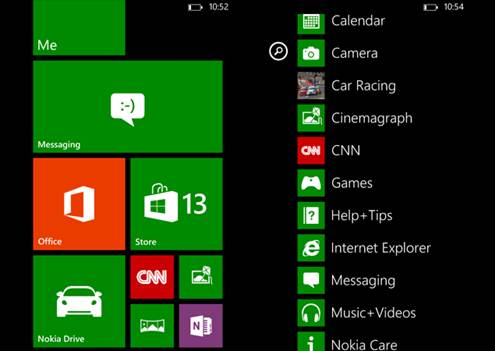Camera
As we mentioned, you will not have that
revolutionary optical image stabilization system. But Nokia is known for
camera-quality smartphones, and the Lumia 820 maintains that, even though it
steps a little behind the 920. According to the Nokia’s specification sheets,
there is no background light sensor here, but there is still a powerful
dual-LED flash and Carl Zeiss lens (f/2.2, unlike the f/2.0 glass of the Lumia
920), combined with an 8MP autofocus camera unit. The interface is similar on
other Windows Phone 8 handsets, with options for white balance, exposure, and
ISO all are stored in the settings. While the backlighting mode available can
save some photos, we are still requiring an HDR mode. The images can be
captured by tapping the screen (which will focus on that area) or using the
two-stage button.

Nokia
is known for camera-quality smartphones, and the Lumia 820 maintains that.
Now, perhaps it is due to the fact that our
expectations were a little lower than when we tested the Lumia 920, but we're
surprised with the satisfying results. All our images captured did not suffer
from much compression and Nokia’s proficiency in shooting has provided some great
images with a low level of noise and there were no colors that were excessive
processed.
We would like to make it clear that the
Lumia 920 still takes better photos. It seems that the white balance proved to
be automatically smarter than on the Lumia 920 and the macro shots appeared to
be clearer, brighter and more colorful on the more expensive models. However,
we were impressed with the low-light performance from the 820, in spite of the
lack of physical image stabilization system, the images often capture more
light from the scene than our eyes did , and with a bit of image noise across
all our test images. The dual-flash is powerful enough to fill the foregrounds
with light, although camera sensor kept on having trouble balancing areas with
high lighting contrast.
Unfortunately, the video recording skills
on the Lumia 820 were not in the same class as the plentiful stable footage we
had with the 920 using anti-vibration system. There is no optical image
stabilization system, you can record a number of fresh high-definition videos
(though they are vibrated) up to 1080p, but we found that the quality was a bit
grayer, more opaque. However, like some previous smartphone models, Nokia’s new
phones provide excellent audio recording capabilities - you can clearly hear
our voice on the video below and the wind did not interfere too much as we've
seen on the other smartphone clips.

The
video recording skills on the Lumia 820 were not in the same class as the
plentiful stable footage we had with the 920 using anti-vibration system
Software
There is not much to add to what we wrote
in the software overview and in the review of Lumia 920, but just to say that
we still remember some of our mobile applications (core) on Windows Phone. The
Lumia 820's AMOLED display presents the most beautiful Live Tile interface,
with satisfyingly deep black colors between these blocks of colors. They are
also richer; update more new messages and notifications, while you can choose
between 3 different font sizes, increasing the visual appeal of the operating
system. Kid's Corner is here and easy to set up, while the Angry Birds Star
Wars is present on Windows Phone on time and at the same time it appears on the
competitive mobile operating systems.

The
Lumia 820's AMOLED display presents the most beautiful Live Tile interface,
with satisfyingly deep black colors between these blocks of colors.
Nokia goes on increasing the experience
with its own exclusive applications (and the user-friendly mapping), which
consists of additional Lens applications for camera (including functions like
panorama, burst shot and lens effects), Nokia Music (free music has also been
upgraded recently), while City Lens furnishes the phone a number of intensively
practical skills that you will find it hard to give up - or never use.
However, there was something new that just
appeared: SkyDrive's official Windows Phone 8 app finally arrived, improving
some connection problems with Microsoft's mobile cloud storage. The two-way
file transfer system works between the cloud and Windows Phone you choose, that
means we may soon begin to transfer your favorite galleries and music to the
additional space allowed by a microSD memory card. You can also create common
links to the images that means Dropbox with ease, while you are also able to
search through your SkyDrive files and folders and avoid browsing the totally
of the free 7GB space provided from the start. However, we do make a few
complaints: unless you browse to the backup settings menu to make sure that
your photos are uploaded automatically in the best quality – which a WiFi
connection is required - you will be left with a collection of smaller images
(the compression feature will compress the file size down).
While there is an option to decide on
whether uploaded and downloaded images are transmitted in the original size or
resized for your phone, we would prefer to select the connection to upload and
the quality level - who wants to save the low-quality images from a phone with
some Nokia's leading imaging technology inside? Unfortunately, the initial
setup will upload your first images in the “good quality” - a trap that will
surely disappoint the camera phone fans, at least at the beginning. We would
also like to get a larger storage, especially because Dropbox has begun to be
involved in the deals with 50GB of free storage capacity. Based on that, 7GB
sounds somewhat useless, though it's still more than what you will get with
Apple's iCloud.